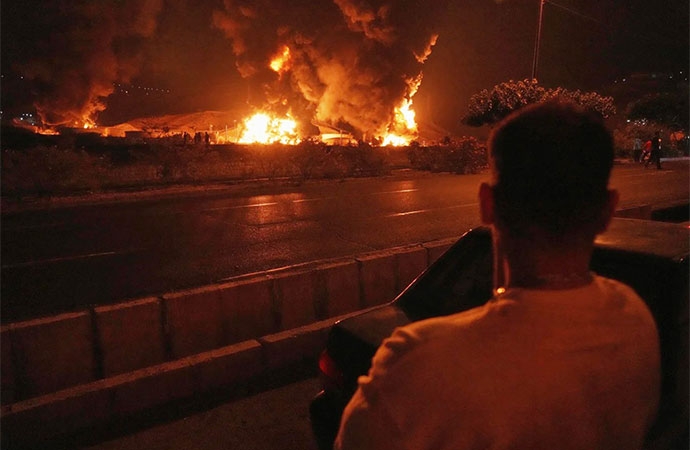Column

A man looks at flames rising from an oil storage facility after it appeared to have been struck by an Israeli strike in Tehran, Iran, early Sunday, June 15, 2025. Photo: AP/UNB
Israel's pre-emptive military strike on Iran is the latest episode in a Middle Eastern conflict that began once upon a vanished time and that appears to have no end in a tangible future. What could be more existential? However, the latest instalment of that conflict raises temporal questions about the motivations, objectives and capabilities of countries, particularly those that are arrayed against each other so implacably as to consider war to be the normal, default and ultimate currency of human exchange. Peace is but the uneasy interregnum between two endless wars. Such is the case in the Middle East today.
Iran's declared hostility to the very existence of Israel is reason enough (according to the Jewish state) for it to attack the Persian power's nuclear installations and senior military and scientific personnel before Teheran develops the nuclear and ballistic-missile capabilities to wipe Israel off the world map. To Iran, Israel has no business being on that map in the first place. Israel is seen as an interloper in Middle Eastern affairs, a malign (but passing) phenomenon created by the colonial West after World War II to continue its impertinent intervention in Muslim affairs through a neo-colonial and racist Zionist entity. Israel recognises that it cannot erase Iran from the Middle East's geography: Iran believes that it can inflict that punishment on Israel.
Clearly, these positions are irreconcilable. And, since Israel obviously will not vacate its territory and relocate to the West (or to any other place that would welcome the appearance of a Jewish state on its soil), the onus must fall on Iran to adjust its geographical ambit to the constraints of global reality. Unfortunately, that has not been the case. The confessional regime in Teheran, led by Shia clerics since the ouster of the Pahlavi monarchy by Ayatollah Ruhollah Khomeini in 1979, continues to believe that Persian history is on its side. In the process, Shia Iran has found itself involved in a competitive quest for regional supremacy with a host of Sunni states, notably Saudi Arabia. Israel is the extended part of an intramural Muslim rivalry. Israel is the outlier in an essentially intra-religious conflict.
That is so for a reason. Palestine is the single most important issue that connects the Muslim world of the Middle East (whether Sunni or Shia) with the wider world. Iran's approach to Israel is predicated on the failure of Sunni states to achieve independence for Palestine, where most people subscribe to Sunni Islam. If Iran can create a Palestinian state by removing the fundamental roadblock embodied by Israel and its Western supporters, Shia Teheran would be able to boast that it is more pro-Palestinian than the Sunni capitals where an independent Palestine is treated as a lost cause. Hence Iran's almost biological hostility to the physical presence of Israel. And also, therefore, the Jewish state's determination to do all that it can to contain Iran through friendly diplomacy with Arab states, failing which war remains the only option. Israeli hardline Prime Minister Benjamin Netanyahu has now exercised the military option. Iran has responded with a display of its military power.
What is happening now is what was bound to happen. As one state takes on another state - or, rather, one leader takes on his rival leader - the masses suffer. So it is for Israeli and Iranian civilians. They are suffering differently, though. A BBC report from an Israeli location where an Iranian missile attack had killed many said that people still supported Israel's pre-emptive attack on Iran. The main reason was that Israel needed to act so that Iran was never emboldened to wipe out Israel with nuclear weapons. Indeed, some Israelis averred that their country should have acted earlier.
It was different in Iran. Israeli airstrikes left people frightened, with many distancing themselves from the clerical regime and pleading that Israel should spare them because they are but civilians. It is clear that there is a certain political distance between the rulers and the ruled of Iran (as there is between rulers and ruled in Israel). However, in the case of Iran, there is a sense that events since 1979 have led the country into a blind alley (down which they are now being pursued by Israeli aircraft, metaphorically speaking). In Israel, there are many who oppose the hardline policies of their present government but even they understand that Israel has to be protected from Iran.
One reading of these responses would be that, on both sides, citizens recognise that Iran is a threat to Israel; Israel does not threaten Iran.
That is so unless Israel, pushed into a blind alley of its own, unleashes its nuclear weapons on Iran. That would turn the tables on the state of affairs in the Middle East.
Both sides need to stick to a more predictable format of interactions.

























Leave a Comment
Recent Posts
Pedaling Through the Mangroves ...
The journey from the bustling streets of Barishal to the serene, emera ...
Why the Interim Government mus ...
Two weeks out from what is expected to be a red letter day in the figh ...
Doesn’t matter who thinks what about Bangladesh deci ..
The Other Lenin
US President Donald Trump said his administration
Govt moves to merge BIDA, BEZA, BEPZA, MIDA